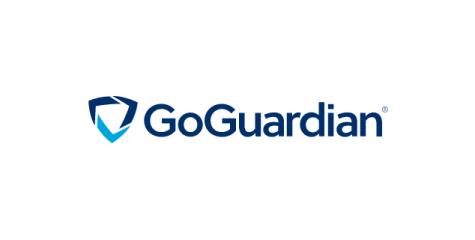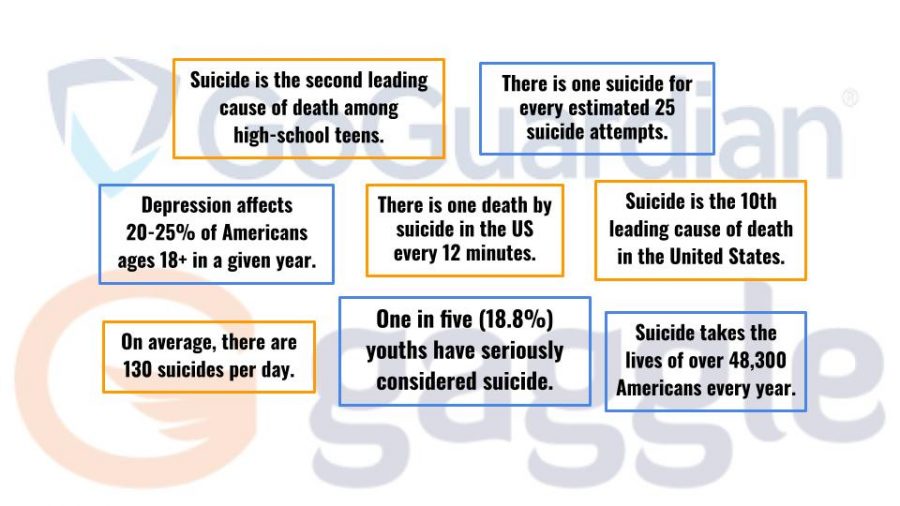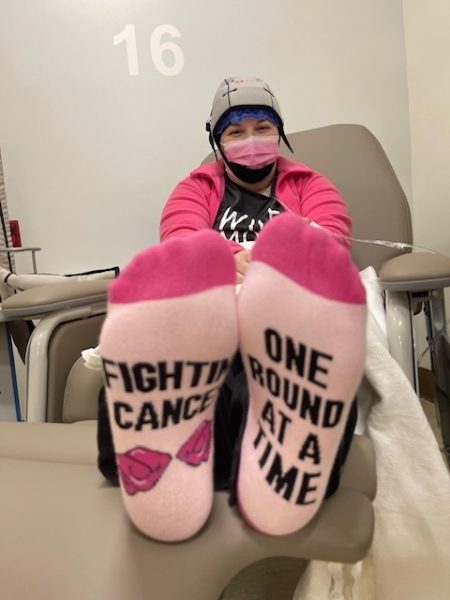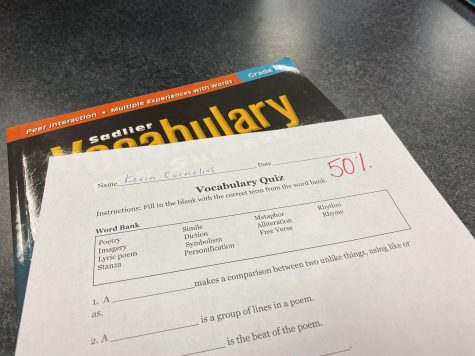Suicide prevention software: The privacy trade-off saves lives
Eliminating suicide one Google search at a time
Gaggle and GoGuardian are committed to tackling the epidemic of suicide.
Suicide is the second leading cause of death among high-school teens. A 2019 CDC (Center for Disease Control and Prevention) survey found that one in five (18.8%) youths have seriously considered suicide, and this statistic was before the pandemic.
We’ve all been told to watch for the warning signs, but in a hybrid school year, how can administrators and teachers effectively be on the lookout for their students’ mental health?
In Frederick County Public Schools (FCPS), most teachers will only see a few of their many students two times a week in-person. Virtual students are locked behind a computer screen choosing to have cameras off, leaving many teachers unaware of what their own students look like, let alone their emotional states. This is an annoyance, for certain, but there are bigger issues. How many of these students are suffering in silence until it’s too late?
Companies Gaggle and GoGuardian are partnering with school systems across the country to eliminate suicide one Google search at a time. While FCPS has not contracted with these companies, I think maybe it’s a good time to consider it.
What are these eyes on us?
Gaggle and GoGuardian Beacon are computer software programs dedicated to suicide prevention and the safety of students. Using artificial intelligence and human intervention, the companies work with districts to identify students in crisis through their computer searches and habits.
Gaggle is compatible with G-Suite, Office365, and Canvas. The company is at work 24/7, looking for references to drug and alcohol use, violent intentions, sexual content, self-harm, hate speech, pornography, and more.
When students violate their school’s internet policy, Gaggle safety management program is alerted. This company takes measures, depending upon the violation, to notify the school district. This includes warnings, notifying school or district contacts, a school emergency contact or law enforcement.
Similar to Gaggle, GoGuardian Beacon works with a 24/7 plan on a “robust and flexible” alert system. GoGuardian isn’t just limited to G-Suite and Office365, but also works across search engines, chat, social media, email, web apps, and more.

Jeff Gordon, Public Relations Director of GoGuardian said, “GoGuardian believes that education is the highest point of leverage for improving society and that digital learning can meaningfully advance educational outcomes for every student, school, and district. Our solutions help thousands of K-12 schools and districts maximize the learning potential of every student by helping educators identify learning patterns, protect students from harmful and distracting content, and support mental health.”
Gordon said that since their founding in 2014, GoGuardian has grown to support 18 million+ students and 500,000+ educators at 10,000+ schools. The company has received more praise and attention in the past year due to the COVID-19 pandemic.
“With educational technology growing ever more common in schools, and in particular the sudden shift last year to online remote learning due to the pandemic, we hear every day how educators are grateful for the tools GoGuardian offers to help support digital learning outcomes,” said Gordon.
Do I have to give up my privacy?
While Gaggle and GoGuardian seem like fantastic solutions for ensuring student safety, many are rightfully concerned about violations of privacy.
Senior Tabitha Knedeisen chose to use a personal device over a school-issued Chromebook. Knedeisen is concerned if companies such as Gaggle and GoGuardian can track a student who is utilizing a computer for non-educational purposes.
“I am not sure if I would be willing to give up all the privacy because I don’t own a school computer. The computer that I use is my own, so the majority of its use is not for school,” said Knedeisen.
Regardless of possible privacy violations, Knedeisen agrees putting a similar system in place is something FCPS should consider. Suicide and self-harm are always non-eductional purposes and these companies answer the silent cry for help.
“I think there should definitely be a consideration because that would cause educators to think more about the mental health of the students, but I don’t think we necessarily need this software,” said Knedeisen.
Rebecca Howes, Linganore’s behavioral support specialist suggests the usage of Gaggle and GoGuardian on school-issued devices would be more beneficial and follow privacy guidelines.
“Usage on any FCPS device is subject to review by FCPS. If these programs were utilized on FCPS devices, I think it would be an added layer of security to ensure students are safe. Although, I do not feel it would be legal and would be a violation of privacy if imposed on a student’s personal device,” said Howes.
Ann McGreevy, the mental health and psychological services supervisor for FCPS, explains that there are alternative ways of tracking this information without the question of privacy violations.
“I think there may be some benefit to them potentially providing an early warning. There are, however, many other ways to get this same information that don’t require students to give up individual rights to confidentiality and privacy and the long term impact of having vulnerable information about them in the cloud, “ said McGreevy.
It’s important to keep in mind that most of those affected by Gaggle and GoGuardian are members of iGen, or GenZ. Born between 1995-2012, GenZ children have spent their entire adolescence in the age of smartphones.
Jean Twenge, author of the nonfiction book iGen, discusses how the use of smartphones has been toxic to both the lifestyle and mental well-being of Generation Z. Born under the age of smartphones, most iGen kids have already given up most of their privacy. Is the usage of Gaggle and GoGuardian any more damaging to our privacy than what we’ve already done?
If they save lives, educators think the tools are worth the sacrifice
In other words, Gaggle and GoGuardian would allow educators to track students’ technology usage whenever they are on the FCPS domain.
Rachel Easterday, a health and physical education teacher teaches an extensive mental health unit to her Fitness for Life students.
“Students are taught the signs of suicide and how to help someone if they fear that they are depressed and might hurt themselves. Students also learn about different mental illnesses and how to get help. I have my students research one mental illness that they are interested in learning more about. I always put an emphasis on having them research where you can get help for yourself or a family member,” said Easterday.
Required mental health units such as the one Easterday teaches raises the question of whether or not researching topics such as suicide and depression for school could become more difficult with the implementation of softwares like Gaggle and GoGuardian.
Despite being a common misconception about protective software companies, Jeff Gordon said that privacy is a top priority for GoGuardian. The company recently signed the “K-12 School Service Provider Pledge to Safeguard Student Privacy 2020,” a pledge certifying the proper use of Student Personally Identifiable Information (PII.)
In the case of GoGuardian Beacon, the company’s most advanced plan, Artificial Intelligence (AI) technology is used to ensure that only students in need of help are detected.
“GoGuardian Beacon, which specifically monitors for students who might be at risk of suicide or self-harm, uses AI to tell the difference between someone who’s researching suicide and someone who is actively planning. The AI is much more complex than a simple keyword search and is constantly evolving through machine learning algorithms,” said Gordon.
These sophisticated systems can filter for class assignments; however, more important, the companies notify the appropriate adults–counselors, principals, and others. They have the call to take action or not.
Nonetheless, Easterday thinks FCPS should consider implementing a safety software, especially during the pandemic.
“I think that right now we have a lot of students and others struggling due to the pandemic and other things going on in their lives. Having something out there that can help us as teachers and staff to identify if a student needs help is a great tool. I would rather speak with a student and find out they are doing good than to miss something and then a student hurt themselves. I feel it comes down to how you communicate things to students,” said Easterday.
Why should FCPS considering implementing this software?
In fact, FCPS is in need of an effective way of tracking student’s mental health. While teachers receive yearly training, most educators don’t have a system in place for monitoring all students. With the outbreak of the COVID-19 pandemic in the last year, FCPS has attempted to make some changes and provide greater outreach to students.
“Unfortunately FCPS does not currently have tools in place that track student’s mental health. FCPS/LHS have adopted the SEL LaunchPad from Coach Rudy to educate and help students regarding social emotional learning. I monitor and check-in with students who I am aware of. LHS sends self-surveys through the SEL curriculum to assess students on feelings and give the option to share if they would like someone to reach out to discuss further,” said Howes.
McGreevy explains how FCPS staff and educators are well-trained in this area. McGreevy knows that school counselors and psychologists are always on the lookout and available for help.
“Any time a student shares (verbally, in writing, on social media, etc), thoughts of self-harm or suicide, the school counselor or school psychologist follows an FCPS protocol to ensure that student’s safety. All school psychologists and school counselors are trained in this procedure and it requires documentation that is collected and used to guide interventions. FCPS has been and continues training all behavioral health staff ( school counselors, school psychologists, behavior support specialists, and others) in Applied Suicide Intervention Skills Training (ASIST),” said Mcgreevy.
Educators and students can agree that a lack of privacy is a worthy cost for saving lives. As technology becomes a crucial part of students’ daily learning environment, softwares such as Gaggle and GoGuardian can ensure that all students’ mental health is accounted for.
“I have been a health teacher for 18 years and each year I have students express to me that they are struggling in some aspect of their life. I always follow up and get them the help that they need. There are often times I think about the students who don’t reach out that I can help. Having a program like this will help identify students who are struggling,” said Easterday.
If you or someone you know is struggling with mental health, please reach out and contact the National Suicide Prevention Hotline: 800-273-8255. You can also visit the National Suicide Prevention Lifeline website to get help. If you live in Frederick County Maryland, visit the Mental Health Association of Frederick website for more hotlines and resources to utilize.
Your donation will support the student journalists of Linganore High School. Your contribution will allow us to purchase camera/recording equipment and software. We hope to raise enough money to re-start a monthly printed issue of our paper.














